We should bite our tongue when tempted to speak ill of others, because a “gossip monger” is a Christian counter witness, and even causes divisions in the Church. Francis warned against this behaviour, which is unfortunately widespread in Church settings, during Mass at Santa Marta on Thursday morning, 12 May.
“Lifting up his eyes to heaven, Jesus prayed”. In the day’s reading from the Gospel of John (17:20-26), Francis noted, “Jesus prayed for everyone, not only for the disciples who were at the table with him, but for everyone”. In fact, John writes: “I pray not only for these, but also for those who will believe in me through their word”. That is to say, the Pontiff affirmed, that Christ “prays for us: he prays for me, for you, for you, for you, for each one of us”. He never stops praying: “Jesus continues to do so in heaven, as our intercessor”. It is important to understand “what Jesus is asking of the Father at this moment: ‘so that they may all be one, as you, Father are in me and I in you, that they also may be in us”. Indeed, Jesus “believes and prays for unity, the unity of believers, as Christian communities”. He conceives of “unity as that which he has with the Father and the Father with him: a perfect unity”. His prayer, according to the Gospel of John, ends like this: “that the world may know that you sent me”. Therefore, “the unity of Christian communities” and “of Christian families” is the “witness to the fact that Jesus was sent by the Father”.
Francis is aware that “one of the most difficult things is perhaps reaching unity in a Christian community, a parish, a bishopric, a Christian institution, a Christian family”. Unfortunately, he continued, “our history, the history of the Church, often makes us feel ashamed: we have waged war against our Christian brothers, let’s consider the 30-year war”. Jesus instead “says something else: ‘If Christians wage war among themselves it is because the Father did not send Jesus, there is no witness”. For our part, the Pontiff said, “we must ask the Lord for a great deal of forgiveness for this history; a history so often of divisions and not only in the past but also today, also today”. The world, he said, “sees that we are divided and says: ‘they have reached an agreement, but we’ll see. How is it that Jesus is risen and lives, but his disciples cannot agree?’”.
Indeed, “we are not even united at Easter!”, Francis said. “Once, a Catholic Christian asked an Eastern Christian, who was also Catholic: ‘My Christ is risen the day after tomorrow, when is yours risen?’”. And in the end “the world does not believe”.
At this point the Pope asked how do “the divisions of the Church” come about? The answer is to forget for the moment “this great division between the Christian Churches” and to go, for example, directly to “our parishes”. The problem, Francis pointed out, is that “the devil came into the world through envy, the Bible says. It was the devil’s envy that brought sin into the world”. Thus “there is selfishness, because I want to be more than another and often times — I would say that it is almost routine in our communities, parishes, institutions, bishoprics — we find ourselves with deep divisions that actually begin with jealousy, with envy, and this leads us to speak ill of one another, we often badmouth”. Referring to an occurrence heard of often in parishes, “in my land it is very common”, the Pope shared, “I once heard it said in a neighbourhood: ‘I don’t go to Church because look at this one, she goes to Mass every morning, receives communion and then goes from house to house speaking ill of others: I prefer not to go than to be this type of Christian, like this gossip monger”. He continued, “In my land these people are called ‘gossip mongers’: they spread gossip, divide and there the divisions begin with the tongue through envy, jealousy and even closure”. This “closure” leads us to pass judgment: “No, the doctrine is this, and this and so on”.
The Pope recalled that the Apostle James, in the third chapter of his letter, says: “We are able to put a bit into a horse’s mouth! Even a ship with a small rudder can be guided. Can we not control our tongue?”. Because the tongue, James writes, “is a little member and boasts of great things”. It’s true, Francis confirmed: the tongue “can destroy a family, a community, a society; by sowing hatred, war and envy”. He returned to the words of Jesus’ prayer: “Father I pray for those who will believe in me, so that all may be one, as you and I”. But there is “so much distance” between the prayer of Jesus and the life of “a Christian community that is accustomed to speaking ill of others”. This is why “Jesus prays for us to the Father”.
Pope Francis then recommended that we “ask the Lord for the grace that he give us strength that these things not exist in our communities”. However, the Pontiff suggested, “Jesus tells us how we must carry on when we do not agree or when we do not like something about another person: ‘Call him, talk!’”. If your interlocutor “does not understand or does not want to, call a witness” and mediate. Jesus “taught us” this way. But “it is easier to badmouth and destroy the reputation of another”.
To strengthen his mediation, Francis recounted an episode of the life of St Philip Neri. “A woman went to confess, and she confessed of having gossiped”. Then “the saint, who was cheerful, good, also generous, told her: ‘Madam, as penance, before giving you absolution, go home, pick up a chicken, pluck the chicken, then go through the neighbourhood and scatter the chicken feathers throughout the neighbourhood, and then come back”. The next day, Francis continued, “the lady returned: ‘I did it, Father, will you give me absolution?’”. St Philip Neri responded eloquently: “No, there is something thing missing, Madam. Go throughout the neighbourhood and pick up all the feathers”, because “this is how gossip is: it sullies the other person”. Indeed, the Pope added, “those who gossip, sully, destroy the reputation, destroy the life and often without reason, contrary to the truth”. This is why “Jesus prayed for us, for all of us who are here and for our communities, for our parishes, for our dioceses: ‘that they may be one’”.
In conclusion, Francis prayed that “the Lord grant us the grace”, because “it is very much the strength of the devil, of sin, that pushes us to division, always!”. It is important to turn to the Lord to “give us the grace, give us the gift that creates unity: the Holy Spirit”, the Pope continued, in the hope “that he give us this gift that creates harmony, because he is harmony, the glory of our communities”. And that “he give us peace, but with unity”. Thus, “let us ask for the grace of unity for all Christians, great grace and small, everyday grace for our communities, our families”. And also for “the grace to bite our tongue!”.

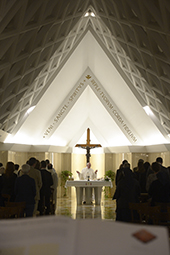
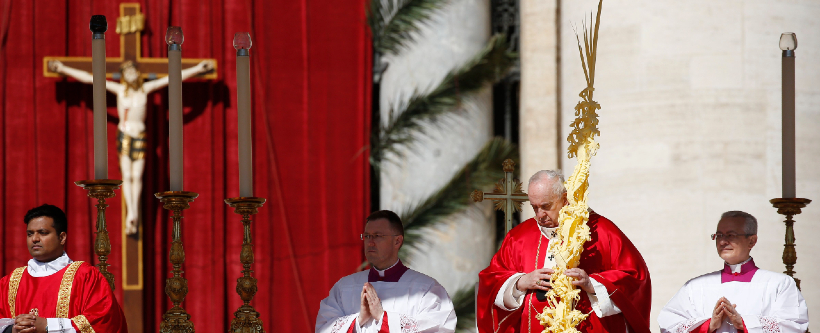
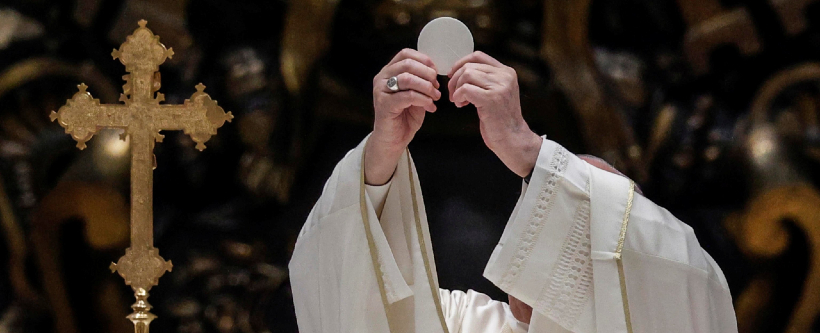
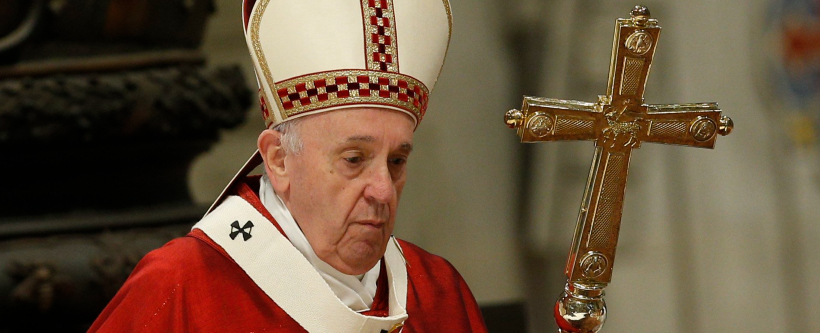
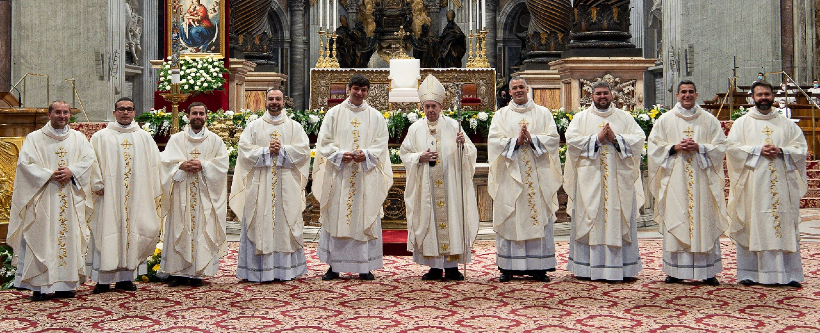
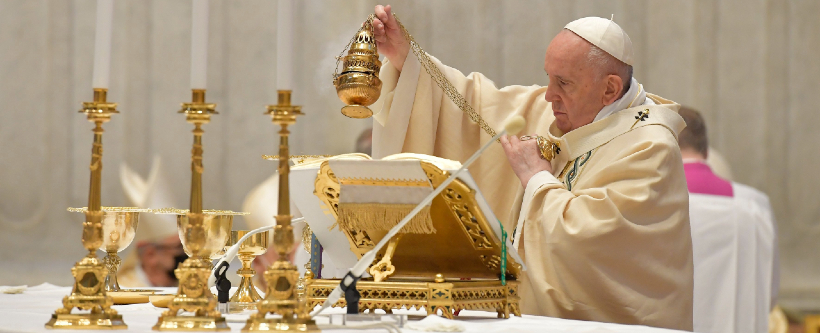
Facebook Comments